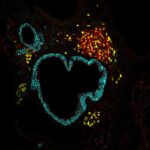
Publication: Expansion and function of CD8+ T cells expressing Ly49 inhibitory receptors specific for MHC class I molecules.
Published in: J Immunol 2004 Sep; 173(6): 3773-82
Authors: Anfossi N, Robbins SH, Ugolini S, Georgel P, Hoebe K, Bouneaud C, Ronet C, Kaser A, DiCioccio CB, Tomasello E, Blumberg RS, Beutler B, Reiner SL, Alexopoulou L, Lantz O, Raulet DH, Brossay L, Vivier E
Summary
MHC class I-specific Ly49 inhibitory receptors regulate NK cell activation, thereby preventing autologous damage to normal cells. Ly49 receptors are also expressed on a subset of CD8+ T cells whose origin and function remain unknown. We report here that, despite their phenotypic and cytolytic similarities, Ly49+CD8+ T cells and conventional Ly49-CD44high memory-phenotype CD8+ T cells present strikingly distinct features. First, under steady state conditions Ly49+CD8+ T cells are poor cytokine producers (TNF-alpha and IFN-gamma) upon TCR triggering. Second, Ly49+CD8+ T cells are not induced upon various settings of Ag immunization or microbial challenge. However, Ly49 can be induced on a fraction of self-specific CD8+ T cells if CD4+ T cells are present. Finally, the size of the Ly49+CD8+ T cell subset is selectively reduced in the absence of STAT1. These results indicate that Ly49 expression is associated with a differentiation program of cytolytic CD8+ T cells triggered upon chronic antigenic exposure. They further suggest that the size of the Ly49+CD8+ T cell subset marks a history of CD8+ T cell activation that might preferentially result from endogenous inducers of inflammation rather than from microbial infections.
Link to Pubmed [PMID] – 15356124


